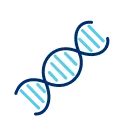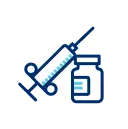
The overactivation of the complement system triggers a destructive cycle of endothelial damage and dysfunction which leads to thrombosis, destruction of erythrocytes and organ damage and dysfunction. aHUS is a life-threatening condition and can lead to stroke, heart attack, kidney failure and premature death.1-2,4-6
In some patients, there may be no identified genetic variant; 30–50% of aHUS patients do not have an identified disease-causing genetic driver. Genetic testing is not required for a diagnosis of aHUS.2,7-10
Some of the complement-triggering conditions linked to the development of aHUS include pregnancy/postpartum, hypertensive emergency, solid organ transplantation, autoimmune diseases, certain prescription medications or illicit drugs, infections, glomerulonephritis, surgery/trauma and malignancy.1,11
Some of the complement-triggering conditions linked to the development of aHUS include pregnancy/postpartum, hypertensive emergency, solid organ transplantation, autoimmune diseases, certain prescription medications or illicit drugs, infections, glomerulonephritis, surgery/trauma and malignancy.1,11









aHUS is a medical emergency – diagnosis and initiation of appropriate treatment for aHUS should not be delayed while awaiting identification of the responsible trigger or aetiology.2








The image shows some common symptoms of aHUS, but it is not an exhaustive list. For a thorough description of symptoms of aHUS, please visit our dedicated Symptoms page.

healthcare professional
